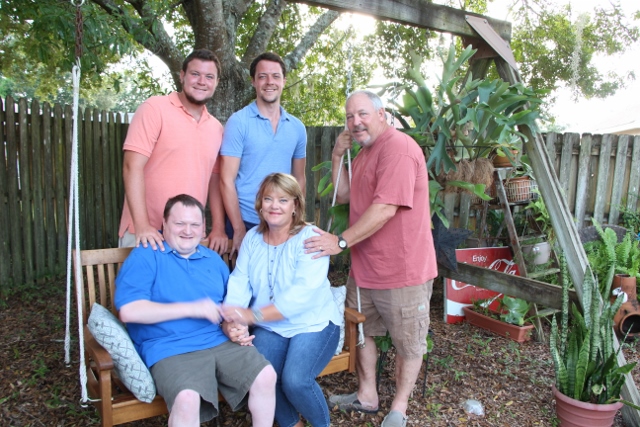How Medicaid Cuts Would Decimate Services for People With Intellectual Disabilities
Cuts to Medicaid… what does that mean to families like ours and maybe yours, and why should you care?
Let me share a small bit about our journey. I grew up in the suburbs of Atlanta, graduated from the University of Georgia in 1980 with a degree in Special Education. Moved back to my home community and began my teaching career in the fall of 1980, working with fourth to sixth graders who had mild intellectual developmental disabilities. Married my guy, Ed, in 1982, continued my profession as a special educator. In the fall of 1985 I moved to a middle school and taught students from ages 12-21 with moderate to profound intellectual developmental disabilities.
In November of 1986 I chose to stay home with our firstborn son, Matt, taking a break from teaching to be a stay at home mom. Here’s where the twist happens in the story of our family… Matt is severely intellectually developmentally disabled. We didn’t know this at his birth, but as development was supposed to occur, he was getting farther and farther behind. At that time, 1986, early intervention services were just beginning and not offered in all areas of America. Our pediatrician at that time was not very helpful, and just kept encouraging us to “give him some time.”
When Matt was about 9 months old, I answered an ad for a part-time special education teaching position with our local early intervention office. I was not informed about early intervention and had no idea that the services that were offered at this office were what we also needed for Matt. Long story short, I began a nine-year career with that amazing team of nurses, social workers, developmental pediatricians, occupational/physical/speech/music therapists and the incredible families we worked with. Matt received his therapies and needed services from this agency, too.

Fast forward in our lives, two more sons. Matt is the oldest at age 30, Neil is 26 living in NYC, Jeff is 22 pursuing a degree in secondary education. We now live in Florida, after moving from Atlanta to Denver. Ed works in the home building industry and I continue to be a stay at home mom caring for Matt. Ed and I just reached our 35th year of marriage this past spring. I left my teaching position about 20 years ago, as Matt’s needs increased and it became more difficult to juggle work and care for our family. We are grateful we had this as an option — many families don’t have the options we did.
Our primary goal was to stay intact as a positive, growing, joyful family, caring for Matt in our family home for as long as we possibly can. We live full, productive, positive lives. He is the motivator for our family; he pushes us to learn, to love, to be compassionate and to laugh at life.
When Matt finished his public education time, at age 21, we were unsure what the next step would be for him. Families of children with disabilities are not given a hand book, it takes much energy to research options and look for programs and resources. Many families are just struggling to keep life going on a day-to-day basis and don’t have the energy or resources to find help.
The Medicaid waiver is a “pot” of federal/state dollars that are specific for helping individuals with intellectual and/or developmental disabilities. Some individuals who need this waiver are not able to be employed to provide for their life-long needs. But that person with Down syndrome or some other type of developmental disability who bags your groceries at the local grocery store is probably also receiving services via a Medicaid waiver.
Do you know someone who has Down syndrome, autism, cerebral palsy, or someone like our Matt? These are people who need the Medicaid waiver to keep them living in their family homes or living in community-based homes with the supports needed. We do not want to go backwards and see the use of institutional care begin again for this most vulnerable population.Every state gets to determine the process for application to the Medicaid waiver and the delivery of that waiver if you are deemed eligible. Most states have lengthy waiting lists, the process is complicated and quite often people never receive funds/services. In our state of Florida, there are over 20,000 people waiting to receive funding/services from the Medicaid waiver. If we decided to return to Georgia, we would have to apply for Matt again and go on their waiting list.
Agencies that provide services paid via the Medicaid Waiver, such as adult day training, cannot bill at a reasonable rate. Because of the low pay, these agencies are not capable of keeping employees, creating a high turnover of staff. Most employees could work at WalMart for better pay and benefits. The state of Florida has left the billing rate for agencies for day programs at a rate that was set in 2003 and has not increased the billing rate. Florida has made an effort to get older individuals off the waiting lists, but families now have difficulty finding agencies to serve their family member due to the low billing rate. Agencies cannot maintain payroll for employees if the billing rate is not commensurate with the services offered, so thousands of agencies have gone out of business.
Our Matt is now 30. He is stubborn, funny, and loves to boss his 58-year-old mom around. He’s a goofy guy. He also needs physical assistance for all his personal care needs, bathing, toileting, dressing and feeding. His intellectual disability doesn’t define him, it’s just a part of who he is. His life has worth and he deserves to be cared for with love, compassion and dignity. We gladly continue to care for Matt in our home.
Matt continues to be on our private health insurance for his health needs, with Medicaid as his secondary health insurance provider. Matt receives a Medicaid waiver to provide for his adult day program which operates from 8-2 Monday-Friday; he also has respite and consumables (diapers/pads/wipes) built into his budget. Since Matt lives at home, his budget is around $20,000 annually to cover those costs. It is not cash we touch — it is an electronic transaction with approved vendors/employees/agencies. If Matt lived in a local group home, like many of our friends in this group, his annual budget needs would be upwards from $65,000 and likely much higher.
Ed has a great job and we are grateful for his employer meeting our needs with his salary and benefits. But if at age 78, when Matt is 50, we are no longer able to care for him at home, without the Medicaid waiver the cost for his annual care would be approximately $100,000 annually. If Matt lives to be 80, we would need to have at least $3 million set aside for him. Well, that won’t happen. We know many families across the country with children with disabilities, many of whose children now live in community-based living (group homes or semi-independent living). I know none who are able to pay out-of-pocket for those services for their kids.
For too long people with intellectual/developmental disabilities have been pushed into dark corners, out of sight for the average American. Just 30 years ago the expose’ of Willowbrook in New York exposed the abuse and atrocities individuals with disabilities had suffered for years in institutional care. Willowbrook was just one example of awful institutional facilities across our country. We have made great strides in providing inclusive lives for all people with intellectual/developmental disabilities; let’s not lose ground and see institutional care become the norm again.
Just this past week, I was reading about Senator Mitch McConnell’s treatments for polio as a young child, at Warm Springs, Georgia. I found it interesting and sad that when Dr. Salk was testing for the vaccine for polio, he used individuals as test subjects who were in institutions for “the feeble-minded.” We are the voices for individuals who can’t speak for themselves. People with intellectual/developmental disabilities continue to be among the most segregated and prejudiced groups in society — let’s not give up on them now.
Editor’s note: This story reflects an individual’s experience and is not an endorsement from The Mighty. We believe in sharing a variety of perspectives from our community.
We want to hear your story. Become a Mighty contributor here.

